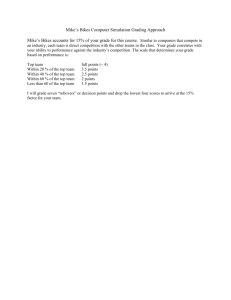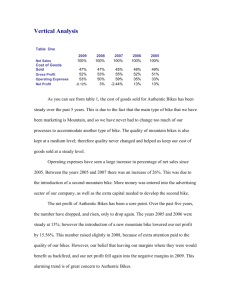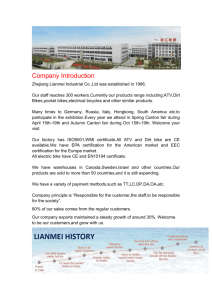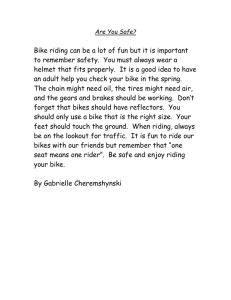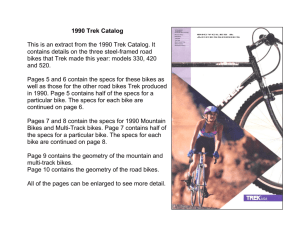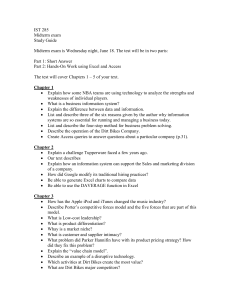GoodWheels - University of California, Berkeley
advertisement
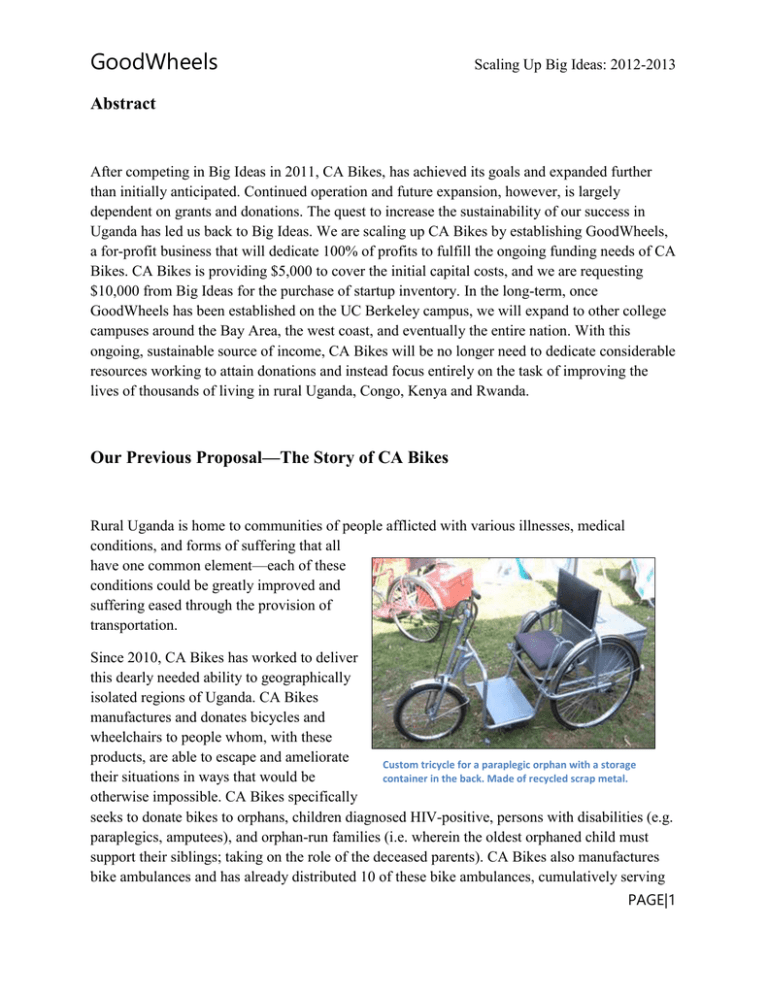
GoodWheels Scaling Up Big Ideas: 2012-2013 Abstract After competing in Big Ideas in 2011, CA Bikes, has achieved its goals and expanded further than initially anticipated. Continued operation and future expansion, however, is largely dependent on grants and donations. The quest to increase the sustainability of our success in Uganda has led us back to Big Ideas. We are scaling up CA Bikes by establishing GoodWheels, a for-profit business that will dedicate 100% of profits to fulfill the ongoing funding needs of CA Bikes. CA Bikes is providing $5,000 to cover the initial capital costs, and we are requesting $10,000 from Big Ideas for the purchase of startup inventory. In the long-term, once GoodWheels has been established on the UC Berkeley campus, we will expand to other college campuses around the Bay Area, the west coast, and eventually the entire nation. With this ongoing, sustainable source of income, CA Bikes will be no longer need to dedicate considerable resources working to attain donations and instead focus entirely on the task of improving the lives of thousands of living in rural Uganda, Congo, Kenya and Rwanda. Our Previous Proposal—The Story of CA Bikes Rural Uganda is home to communities of people afflicted with various illnesses, medical conditions, and forms of suffering that all have one common element—each of these conditions could be greatly improved and suffering eased through the provision of transportation. Since 2010, CA Bikes has worked to deliver this dearly needed ability to geographically isolated regions of Uganda. CA Bikes manufactures and donates bicycles and wheelchairs to people whom, with these products, are able to escape and ameliorate Custom tricycle for a paraplegic orphan with a storage their situations in ways that would be container in the back. Made of recycled scrap metal. otherwise impossible. CA Bikes specifically seeks to donate bikes to orphans, children diagnosed HIV-positive, persons with disabilities (e.g. paraplegics, amputees), and orphan-run families (i.e. wherein the oldest orphaned child must support their siblings; taking on the role of the deceased parents). CA Bikes also manufactures bike ambulances and has already distributed 10 of these bike ambulances, cumulatively serving PAGE|1 GoodWheels Scaling Up Big Ideas: 2012-2013 approximately 10,000 people a year. Due to the success of these bike ambulances and the impact they have had on the ability of Ugandan emergency services to reach rural communities CA Bikes has orders for and is currently building 250 more of these ambulances. These have already been ordered and are in the process of being manufactured and scheduled to be completed and delivered by the end of 2013. Bikes provided by CA Bikes have enabled HIV-positive children to attain the medication that would otherwise be too far away for them or a family member to obtain. Wheelchairs give mobility to the physically disabled and amputated people in rural areas that would otherwise be confined to a lifetime of dependence on their families. These families must struggle everyday with the burden of supporting a non-working family member; ultimately creating situations where they can barely provide enough food and water to support themselves. With their newfound mobility, the recipients of these wheelchairs are not only freed from dependence but also liberate their families from the role of caretakers. Each bike and wheelchair provides a multiplied benefit to the recipients, their families, and their communities. The wheelchairs and bikes we donate to these communities are more than charity; their benefits represent improved standards of living and an active effort to improve communities in regions geographically isolated from many life-improving, if not life-saving, resources and services. CA Bikes—Our Impact, Progress and Future Since competing in 2011, we have used our initial funds from Big Ideas to transform our idea into the rapidly growing success described above. Thanks to the start up possibility provided by Big Ideas, CA Bikes has been able to demonstrate our successful impact and, in the process, draw the attention of other organizations willing to aid our cause with grants. Specifically, we have received grants from Chevron, Judith Lee Stronach, the U.S. Embassy in Uganda, and from Zambikes International. All of this grant money has gone towards two programs. First, we have a donation Irene: Orphan recipient of bike-donation program program that assists over 600 orphans, children diagnosed HIV-positive, orphan-run families and physically disabled people and their families. Second, we have enabled children to attend school by not only providing a bike with which to get to school, but also the costs of attending PAGE|2 GoodWheels Scaling Up Big Ideas: 2012-2013 school including books and tuition. These are children who, would not have been able to attend school otherwise due to the prohibitive distance, often up to ten miles away from their homes, as well as the hardship it would create for their families due to the loss of productive family member combined with the cost of education. Due to the geographic isolation of the communities we are currently serving, a consequence of the expanding success of our products includes an increase in the cost of basic operations. When starting our initial programs, we were able to cover many costs through pursuing grants. Longterm, the setback with this approach is the inherently finite nature of grants as well as the competitive and time-intensive nature of grant proposals. As previously mentioned, we have tried to cover some of our costs by pursuing profits locally with the sale of 250 ambulance bikes from scrap metal and selling them to hospitals in Uganda. Unfortunately, this expected revenue is not enough to close our growing budget gap. This solution provides only a short-term fix due to the limited market. The revenues from the sales of these bike ambulances will be quickly depleted in order to maintain the existing level of bike donations and community support. In short, the efficacy of our products and donation program aimed to improve the lives of thousands of people in rural Uganda has caused Bike Ambulance demand for these wheelchairs and bikes to be much higher than our initial budget can provide for. To ensure the continued success of CA Bikes, a stable, continuous source of income is needed. Our solution to make the overwhelmingly successful CA Bikes program financially sustainable will be the creation of a for-profit business – GoodWheels – based in the United States, whose profits will go to fund CA Bikes. GoodWheels, will provide a safe, convenient outlet for the students and faculty of UC Berkeley to purchase and sell bikes with the goal of future expansion to other universities with bike-riding cultures. PAGE|3 GoodWheels Scaling Up Big Ideas: 2012-2013 PAGE|4 GoodWheels Scaling Up Big Ideas: 2012-2013 GoodWheels The City of Berkeley has one of the highest bike-riding populations in the nation, with many residents relying on cycling as their sole means of transportation. Large portions of these cyclists are undergraduates, graduate students, faculty, and professors of UC Berkeley. Given the high number of residents who reside temporarily in Berkeley, there is a generally high turnover of bikes being bought and sold via online classified ads. During the beginning and end of semesters there are several-hundred bikes listed for sale on classified ad websites and are typically priced below their potential value due to the time-sensitive situation faced by sellers intended on moving out of the area. Conversely, only four to five weeks later students are looking for bikes and often overpay for used bikes or buying them new at a local cycling shop for an even higher retail price. GoodWheels intends to fill this disconnect in the local market between people moving out of Berkeley who need a convenient way to sell their used bicycle and those moving into the area looking for a functional bicycle. GoodWheels will connect these two parties by providing a cheaper, safer, socially beneficial, and more convenient way to buy or sell a bike. Currently there are no businesses serving this market in Berkeley that are able to sell or advertise directly on campus, nor is there a similar model of business buying and selling used bikes in the immediate area. GoodWheels will be run by “Students for CA Bikes,” an official student group we have created at UC Berkeley. This student group status will allow for greater direct advertising abilities on campus, including but not limited to: distribution of flyers, canvasing, tabling, dissemination of literature, classroom announcement, and welcome-week events. While GoodWheels is developing a reputation and working towards self-sustainability, the student organization will be in charge of developing awareness on campus. Once GoodWheels has been established and is operating stably, Students for CA Bikes will be put in charge of management and organization of the franchise. New members will be able to participate in activities while introduced to the structure of how the business operates. As they become more familiar with GoodWheels and develop more experience with the business aspects they will be able to step into leadership roles. This will allow socially conscious students to become involved without GoodWheels becoming dependent on their efforts. Opportunities would be available for students who wish to continue to support Students for CA Bikes after graduating. CA Bikes who will monitor the business and leadership and step in if serious problems are detected. This oversight will allow Students for CA Bikes to operate independently while still protecting the business from mismanagement and allow CA Bikes to focus on funding bikes and ambulance bikes in Uganda. GoodWheels will operate for a total of seven weeks in the year. The majority of bikes sold in Berkeley are at the start of semesters, specifically to students and faculty. GoodWheels will sell bikes for the first week of the eight-week and ten-week summer sessions and for the first two PAGE|5 GoodWheels Scaling Up Big Ideas: 2012-2013 weeks of the fall semester starting on the university dormitory move-in day. The target market for the summer sessions are the nearly 3,900 visiting students. Many of these students come from European countries with strong bike-riding cultures and who would be likely to purchase a bike during their stay. GoodWheels will be easily accessible to these students who are acclimating to a new location and would offer them a convenient buying and selling experience. It is expected that the majority of business will be done in the two weeks at the beginning of the fall semester when 8,000 incoming freshmen and transfer students will be moving into dorms and apartments, many will also be searching for bikes. These students are focusing on buying supplies and getting settled in their new school environment and GoodWheels would offer them easy access to bikes at a central location (i.e. Sproul Plaza). GoodWheels will attract customers in the Berkeley area by offering several incentives. Incentives to using GoodWheels 1. GoodWheels will have the same price levels as bikes on Craigslist and other online classified sites where used bikes are commonly listed for sale. 2. GoodWheels, unlike online classified sites, will provide a convenient, central location for customers to sell their bikes and for buyers to view multiple used bikes at one time. 3. Selling and purchasing a bike with GoodWheels will provide customers with a sense of security and quality assurance that is missing from transactions with a stranger online. 4. GoodWheels offers customers a socially beneficial way to purchase a bike. They will know that all profits will be used to build custom bikes for orphans and people with disabilities in Uganda who rely on them for, otherwise unobtainable, life-saving medical treatments as well as opportunities for education and employment. Expansion Possibilities and Scalability After establishing a successful business model in the Berkeley area, GoodWheels will expand to other communities in the US that have strong bike-riding cultures. GoodWheels is intended to be a scalable, socially beneficial business model that will be easily adopted, at other universities with biking communities. Expanding to other universities allows for GoodWheels to operate as a student-run business organized as a chapter on campus. We are currently working with new PAGE|6 GoodWheels Scaling Up Big Ideas: 2012-2013 contacts at Stanford University who are interested in setting up a chapter. This area is known for having a large cycling community and a revolving student body interested in purchasing bikes for commuting to and from school and work. Additional areas with established bike cultures providing potential expansion opportunities include UC Santa Cruz and UC Santa Barbara and UC Davis. With the development of these franchises, GoodWheels will have a significant market in which to develop and provide funding to CA Bikes. With this more consistent source of income, CA Bikes will be able to fund their expansion beyond Uganda and into the DR Congo, Kenya, Rwanda and beyond. Explanation of how Good Wheels works Acquiring Inventory: GoodWheels will purchase its initial inventory of used bikes by setting up a buying tent on campus for two weeks at the end of the spring semester and one week at the end of the summer semesters. GoodWheels will employ a temporary, experienced bike mechanic at the start of the inventory-buying process until the end of the selling period at the beginning of the fall semester. This bike mechanic will staff the bike buying tent where he will assess potential bikes brought to the tent by anyone wishing to sell their used bikes. The bikes will be purchased based upon the mechanic’s assessment of the potential resale value and condition of the bike. GoodWheels will only purchase bikes that require minimal touchups and minor repairs that will be made by the same mechanic. Upon thorough assessment of the bikes quality and resale readiness, our mechanic will purchase the bike. For students and exiting faculty or staff, the convenience and centrality offered by GoodWheels to quickly sell a used bike on campus differentiates us from alternative means of selling a used bike at the end of the semester via an on online classified ad. For people attempting to relocate, selling a bicycle online presents an unnecessary hassle, most likely requiring multiple emails and being in correspondence with several potential buyers, while also presenting the potential dangers associated with meeting strangers online to exchange money. Another problem associated with selling bikes in this manner is that it requires potential buyers at a time when fellow students are preparing to go on vacation and are not interested in purchasing a bike. GoodWheels would capitalize on the opportunity to fill this gap in the market by offering convenience, safety, and a better price to people attempting to sell their bikes before moving. GoodWheels will be able to offer those selling bikes a better price than online classified ads because we will be storing the bikes and reselling them when demand picks up. PAGE|7 GoodWheels Scaling Up Big Ideas: 2012-2013 A rented truck will transport all of the purchased bikes to our Public Storage unit where they will be securely stored until the on-campus selling events. The Bike-Selling Process: GoodWheels will sell bikes during the start of the summer and fall semesters on campus. GoodWheels will travel with a large selection of bikes and setup a tent store on or next to campus. This event will be an opportunity for international, returning, and new students to purchase a bike quickly and conveniently. We will have student volunteers from the “Students for CA Bikes” student group assisting our mechanic with sales. Our mechanic and volunteer sales assistants will use an Intuit mobile credit card reader at the sales tent enabling them to accept payment on location, eliminating the inconvenience and issues of accepting cash. The bike sales tent will initially be operating from 12pm to 3pm during the selling periods with potential to adjust times depending on demand. Startup Funding Request for Scaling Up In order to make the charity work of CA Bikes sustainable, GoodWheels first needs to be established as a profitable venture. To accomplish this, GoodWheels must make up a $10,000 start-up cost gap that we project to more than recoup by years end. This amount breaks down as follows. For initial inventory and operating costs, we have budgeted $11,000. We currently have $5,000 allocated from CA Bikes, $4,000 of which will be spent on business expenditures such as sales tent, tables, website development, and advertising. Therefore, our Big Ideas funding request of $10,000 would be dedicated to the purchase of inventory and operations. Revenue from the summer sales will provide funding for the purchase of additional inventory in anticipation for the fall event as well as cover the cost of additional truck rentals and the temporary mechanics hourly wage. The plan is to start by purchasing a small amount of bikes and slowly building towards the larger volumes of business our research indicates are possible. By starting small and growing, it allows us to protect ourselves from over-purchasing inventory while we are still trying to establish our brand as a quality bike provider with humanitarian aims. Impact Statement We will have two main criteria for measuring the impact of GoodWheels. The first will be our ability to reach our sales goals for our first business year. From our research we expect PAGE|8 GoodWheels Scaling Up Big Ideas: 2012-2013 to be able to buy and sell 45 bicycles by the end of the second week of the new fall semester. With the revenue generated from this period and a full year to publicize our company, we project being able to buy and sell 70 bikes. If by the beginning of our second year in business we are able to reach these sales goals then we will be able to consider GoodWheels a sustainable method for supporting CA Bikes’ donation programs. At this point we will be ready to start expanding GoodWheels to other university campuses. Our second criteria relates to the group Students for CA Bikes. This group will be managing GoodWheels and so it is important to maintain a strong leadership core and attract new members. We plan to measure the number of members currently active in the Spring of 2014 and the number of active members who were involved in our first sales period. Therefore, the criteria for success will be an increased participation and retention of our current executive group. Timeline We have already formed the Students for CA Bikes group that will assist in the implementation of GoodWheels. This group is currently is working at increasing awareness of CA Bikes and planning to manage and publicize GoodWheels. We are currently constructing a website that will provide information about the times and locations that we will be purchasing bikes and is expected to go online at the start of April. We plan to supplement this website with distribution of flyers and tabling events. Around this time we will use the start-up funds provided to CA Bikes to purchase the equipment and other business essentials. At the end of the semester we will use the remainder of these funds to purchase a small initial inventory of bikes, pay our mechanic and rent our storage space that we will sell at the start of the summer sessions. With the distribution of Big Ideas money coming in the June, we will post advertisements to acquire the rest of our inventory from visiting summer students who need to sell their bikes before returning home. This inventory will then be sold at the beginning of the fall semester. During the period after the sales event we will focus on the development of Students for CA Bikes and analyzing the results of our first sales period. The rest of the year will be spent fine-tuning plans for the spring purchasing period and increasing awareness of GoodWheels and its services. Conclusion Since our previous success in Big Ideas, CA Bikes has helped provide bicycles and ambulance PAGE|9 GoodWheels Scaling Up Big Ideas: 2012-2013 bicycles that have improved the quality of life for the recipients in poor, rural areas of Uganda. While this has been a success in terms of poverty alleviation, CA Bikes is currently dependent on ongoing donor financing. In order to continue the great work being done by CA Bikes and to expand this program to include additional countries, CA Bikes needs to reduce and eventually eliminate its reliance on grant money and ambulance orders. GoodWheels is the solution. We have already created the Students for CA Bikes organization that will administer GoodWheels, and have recruited an enthusiastic group of highly-qualified students to ensure success. We are grateful for the support Big Ideas has provided us in the past, and it has helped us aid many in need. With this Scaling Up prize, we look forward to moving beyond need for ongoing donor financing. By Scaling Up CA Bikes through the GoodWheels program, Big Ideas will allow us to focus more on helping people and less on acquiring funding. PAGE|10 GoodWheels Scaling Up Big Ideas: 2012-2013 Our team Christopher Ategeka: PhD Candidate: Mechanical Engineering Chris is an engineer, inventor, and entrepreneur. Chris holds a BS and an MS in Mechanical Engineering from the University of California, Berkeley and is currently pursuing his PhD at Berkeley. He is the founder and Director of CA Bikes Uganda which was a Big Ideas project 2010-2011 titled “Pedal or power project”. Chris has appeared in several magazines, newspapers and earned multiple awards and recognitions for CA Bikes work latest being UC Berkeley’s Chancellors Award for public Service 2011-2012. He recently was invited to give a TED Talk about the work done by CA Bikes. Nicholas de Raad: Undergraduate: Political Economy Nicholas de Raad is currently a senior at UC Berkeley studying Political Economy focusing on issues in Post-Industrial Societies. He has been involved with CA Bikes since spring of 2012. Upon graduation in May 2013 he will be starting his career with Fisher Investments as an Investment Associate. He plans on continuing his work with CA Bikes International and GoodWheels. He intends on enrolling in a J.D./MBA joint degree program at some point in the future. Priyal Sheth: Graduate: Haas School of Business Priyal Sheth leads is leading the financial management along with strategic planning for Goodwheels. He is a bike enthusiast and currently a second year MBA student at Haas School of Business, UC Berkeley. He also holds a Master’s degree in Bioengineering from UC San Diego. Prior to Haas, he worked at several biotech and pharmaceutical companies including a startup where he was a key contributor in helping the company take two drugs to phase II and phase III of clinical trials. He was also VP of Finance at Asha for Education and successfully raised $30,000 which funded over 6 different projects including training 30 teachers and coaching 300 students. Alex Hayashi: Undergraduate: Mechanical Engineering Alex Hayashi is a senior Mechanical Engineering student currently studying at UC Berkeley. He became involved in CA Bikes in the Fall of 2012. He sees CA Bikes to be an excellent way to combine his engineering degree with his desire to give back to the global community. He has previously been engaged in humanitarian work in Cambodia with the Tabitha Foundation, as well as volunteer work with Amnesty International. In the future he plans on enrolling in an MBA program and is excited about getting a chance to help a start up. PAGE|11 GoodWheels Scaling Up Big Ideas: 2012-2013 Appendix-Sources Berkeley Admission Statistics Bike Sales Cost Bike Sales Numbers Business License in Berkeley Canopy and Graphic Design CitiBusiness® Streamlined Checking Account City of Berkeley Bike Plan Estimation for Fuel cost Intuit GoPayment Mobile payment system Park Tool Professional Bicycle Tool Kit PK 63 Statistics for Bike Ridership Storage for Bikes Trademark Application Fee Truck Rental Cost Wages for Bike Mechanic Web Hosting http://opa.berkeley.edu/statistics/UndergraduateProfile.pdf Research on http://sfbay.craigslist.org/ averaging cost of bikes sold Phone interview with Missing Link Bicycle Co-op Berkeley, 1988 Shattuck Ave. http://www.ci.berkeley.ca.us/businesslicense/#NewBLApplication s http://www.ecanopy.com/ https://online.citibank.com/US/JRS/pands/detail.do?ID=CitiBizCh eckingAAG http://www.ci.berkeley.ca.us/uploadedFiles/Public_Works/Level_ 3_-_Transportation/berkeley%20bike%20plan.pdf http://www.Fueleconomy.gov http://gopayment.com/pricing/ http://www.amazon.com/Park-Tool-PK-63-Professional-63Piece/dp/B00172903I http://www.bikeleague.org/news/acs2010.php http://www.publicstorage.com/locations/Californiastorage/Berkeley-CA-storage/381-94710-1004-storage.aspx http://www.uspto.gov/trademarks/teas/index.jsp http://www.uhaul.com/ Interview with employees at BART Bike Station Berkeley, 2208 Shattuck Ave, Berkeley. www.ipage.com PAGE|12
